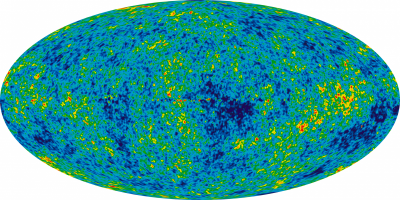Cosmic microwave background

The Cosmic Microwave Background (CMB) is due to the thermal photons remaining from the hot initial state of the Universe (commonly referred to as Big Bang). They have been emitted when the Universe became sufficiently cool so that neutral hydrogen could form. At this time, when the Universe was only about 380'000 years old (very little compared to its current age of 13.8 billion years in the standard model) the cosmic plasma became transparent to photons. The CMB is effectively a 'photograph' of the young Universe, showing the tiny fluctuations that are the seeds of the large-scale structure observed today. It is the most precious cosmological dataset for two reasons: Firstly, its anisotropies and soon also its polarization are measured with high precision, by the WMAP and Planck satellites. Secondly, we understand them well theoretically and can calculate them to good precision with cosmological perturbation theory. The combination of these two reasons means that we can use the CMB to estimate the parameters of the cosmological standard model and its variants, e.g. including primordial magnetic fields, to excellent precision (in cosmology this means a couple percent). According to the current understanding, the anisotropies and polarization of the CMB contain information about the earliest epoch of the Universe, inflation. Especially Non-Gaussianities in the distribution of these quantities can contain information about particle physics interactions at 1016 GeV, an energy about 12 orders of magnitude larger than what can be achieved the most powerful present particle physics accelerator, the LHC. A pedagogical introduction to the physics of the CMB is given on Wayne Hu's website.
Pages
Address
Département de Physique Théorique
Université de Genève
24, quai Ernest Ansermet
1211 Genève 4
Switzerland
Directions & contact



